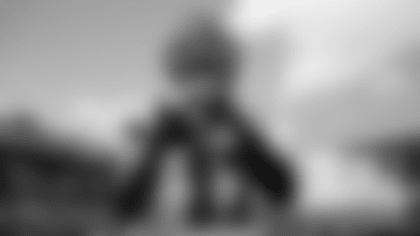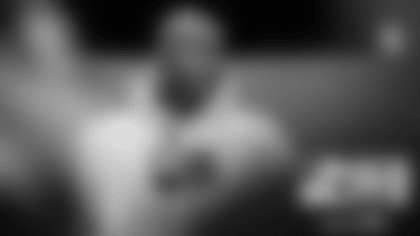Warrick Dunn's improvisational pitch back to Shaun King. Mike Alstott's do-or-die two-point conversion. Matt Bryant's 62-yard stunner.
If there is a highlight reel playing in the mind of a long-time Tampa Bay Buccaneers fan, these unforgettable moments are sure to be included. And in the background of each one: Cheers from the home crowd.
Yes, Ronde Barber's 92-yard interception return against Philadelphia's Donovan McNabb and Derrick Brooks' title-sealing pick off Oakland's Rich Gannon are probably the two most famous plays in team history, but each happened in a far-off city, and in the playoffs. Dunn's game-saving pitch to King was part of an exhilarating Monday Night Football game at Raymond James Stadium in December. Alstott's score unleashed an enormous roar from the RJS stands. Bryant's historic field goal landed not far from the famous pirate ship at the Buccaneers' home.
And, as it just so happens, Tampa Bay's 2012 regular-season home schedule is going to provide plenty of opportunities to reminisce about moments like these. By sheer coincidence the team's roster of opponents this fall doubles as a list of teams that helped created some of the most indelible memories in Buccaneers home-game history. Who could forget that high-octane Monday night thriller against the Rams, a revenge game that doubled as a playoff must-have for both teams? How about the first truly win-or-go-home game in franchise history, featuring the Kansas City Chiefs and an unholy storm? And there are Raymond James Stadium memories featuring the Eagles that nearly rival that pivotal Ronde Barber moment in January of 2003 (and just might have featured Barber again).
Those Rams, Chiefs and Eagles are coming back to Tampa next fall, along with other teams that have figured prominently in Buccaneer history. Let's take a look at the most unforgettable games played in Tampa in each of the eight series that will be rekindled this fall.
Atlanta
- Buccaneers 27, Falcons 24 (OT), Dec. 24, 2005
There are plenty of thrilling games we could have chosen from this rivalry, but for sheer drama, both in terms of the game and the overall playoff picture, the showdown at Raymond James Stadium late in the 2005 season can't be beat. The Bucs and Falcons have a long and contentious history together, and it has peaked several times in Tampa, including a 24-23 decision in December of 1981 that was won by Doug Williams' 71-yard fourth-quarter TD pass to Kevin House; a record-setting afternoon by Steve DeBerg, who threw five touchdown passes to beat the Falcons 48-10 on opening day of 1987; and a very memorable showdown against a red-hot Michael Vick late in the Bucs' 2002 Super Bowl season, won by Tampa Bay's amazing defense, 34-10.
On Christmas Eve day in 2005, however, the Buccaneers saw their playoff dreams nearly crushed and then incredibly resuscitated in one wild overtime battle.
The Buccaneers came into their Week 16 game against the Falcons with their hopes of an NFC South title still alive but their postseason chances overall resting on a razor-thin wire. Carolina suffered a last-minute loss to Dallas while the Bucs and Falcons were still contesting their game, which meant a Tampa Bay win would give the Bucs a tie for first in the South with the tiebreaker in hand and one week to play. However, a loss would throw Tampa Bay into a murky scrum for an NFC Wild Card spot.
Putting up his most prolific passing numbers to date, Chris Simms led the Bucs to a 14-7 first half advantage with touchdown passes to fullbacks Jameel Cook and Mike Alstott, but the Falcons eventually surged back for leads of 17-14 and 24-17. Only four minutes remained in regulation when Atlanta's own jumbo back, T.J. Duckett, powered in from two yards out to give Atlanta that seven-point lead.
It was at this point that eventual NFL Rookie of the Year Cadillac Williams began to take over. He rushed four times for 26 yards and caught a 10-yard pass on the ensuing 70-yard drive, and was the Bucs' last hope when they faced a fourth-and-one at the Atlanta six with 31 seconds remaining. The Bucs sent Williams over left tackle on the play and he broke through for a first down and the game-tying TD, sending the game into overtime.
Tampa Bay's division title hopes thus revived, they almost immediately then expired. The Buccaneers won the toss to start overtime but WR Edell Shepherd fumbled on the opening kickoff and the Falcons recovered at the Bucs' 18. Needing only a short field goal to win, the Falcons plunged Duckett into the line twice, got eight yards and lined up Todd Peterson for a 28-yard gimme of a field goal try. Fortunately for Tampa Bay, defensive end Dewayne White saved the season with one swipe of his right hand.
White managed to penetrate the Atlanta line and block Peterson's attempt, and CB Brian Kelly nearly broke free with the recovered football for a long score. That forced the Bucs to drive into field goal range on offense, and they did so by handing into it to Williams on four of the first five plays for 27 yards. Joey Galloway then caught a 30-yard pass on third-and-five down to the Atlanta nine and the Bucs were lined up for their own chip shot try. However, Matt Bryant surprisingly hooked his try wide left and the game rolled on.
A trade of punts left Atlanta with the football at their own 16 and just two minutes to play. The Buccaneers were getting close to finishing with just the second tied game in franchise history, which would do nothing for their division title hopes. The Falcons, also in the NFC playoff hunt, were trying to determine, as their drive got off to a slow start, if a tie would keep them alive. Eventually, they faced a fourth-and-two at their own 24 with 1:08 to play. A punt gave them their best shot at a tie, while a fourth-down conversion would either keep their hopes for a victory alive or give the ball back to the Bucs in prime field goal range. They elected to punt, and the Bucs had one last shot, and a good one thanks to a 28-yard return by Mark Jones back to midfield.
Simms completed passes of 15 and 11 yards, both followed by quick spikes of the football and Bryant got another shot from 41 yards out. He nailed it with 19 seconds to play for the very protracted "sudden death" victory and the Bucs would go on to win the division the following week.
Said Simms after the game, giving readers a hint of what they may find lower on this page: "You don't think you'll ever go through a game as exciting as the Redskins game, and this one tops it."
Carolina
- Buccaneers 16, Panthers 13, Oct. 18, 1998
In contrast, most of the nail-biters in the Bucs-Panthers series have taken place in Charlotte, and the down-to-the-wire action at Raymond James Stadium has tended to end in Carolina's favor. The 12-9 Panthers win early in 2003, which hinged on a blocked extra point at the end of regulation, comes to mind, and not in a particularly enjoyable way.
However, before the Bucs and Panthers became NFC South division-mates in 2002, they did take one RJS meeting to the bitter end in 1998, a season of wild ups and downs for Tampa Bay.
Coming off their breakout 1997 campaign under Head Coach Tony Dungy, which led to the team's first playoff berth in 15 years, the Bucs got off to a rough start in 1998, losing three of their first four. However, a dominating win over the New York Giants in Week Five got them back on track before the bye week and they came back from the break with another home game against the Panthers.
Defenses ruled early as each team put up only a field goal in the first half. Tampa Bay held the Panthers to 96 first-half yards and sacked QB Steve Beuerlein three times. The Bucs' offense was able to move the ball, with 224 yards before the intermission, but Carolina forced the only turnover of the half, one of two they would have on the day to none for Tampa Bay's defense.
Carolina started to pull away in the second half, with 10 third-quarter points keyed by Fred Lane's one-yard TD run after a Trent Dilfer interception. In the fourth period, however, Dilfer engineered a 14-play, 80-yard drive, converting three third downs, the final one his own one-yard touchdown run on a naked bootleg that worked to perfection. Dunn ran eight times for 43 yards on the drive, but their were only five minutes left after Dilfer's score, and only 2:47 when the Bucs finally got the ball back…and they almost didn't get it back thanks to the game's most controversial moment.
On third-and-nine from the Carolina 25, Beuerlein completed a short pass to WR Anthony Johnson, who was then stripped of the football by LB Derrick Brooks. Bucs CB Anthony Parker got a hand on the ball but it ended up in Muhammad's possession, short of the first down. Originally, the officials ruled that Parker had recovered the fumble and then subsequently been stripped of the ball himself, which would have constituted two changes of possession and given Carolina a new set of downs. However, the officials stopped the game to confer and eventually reversed their decision, saying Parker never had possession, and the Panthers had to punt.
The Bucs got to midfield just before the two-minute warning but fell into a third-and-16 and nearly stalled on a third-down incompletion in Bert Emanuel's direction. However, Carolina's Rod Smith was called for interference on the play and the home team had new leaf at the visitors' 29-yard line. On the very next play, Karl Williams ran to the deep right side of the end zone and Dilfer hit him for the go-ahead touchdown, with "The Truth" acrobatically getting both toes down inbounds. As it turned out, that still didn't cap the day's drama.
K Michael Husted shockingly missed the extra point, hooking it left, which meant Tampa Bay's lead was just three points instead of four, with 1:39 to play. Beuerlein hit WR Muhsin Muhammad for gains of 19 and 11 yards and was able to drive the Panthers to the Bucs' 29. John Kasay came on to try a 47-yard field goal but he missed it to the left and Tampa Bay held on to the victory.
Kansas City
- Buccaneers 3, Chiefs 0, Dec. 16, 1979
The first shutout by the Buccaneers in their four-year history remains one of the most memorable and significant days in franchise annals.
Tampa Bay went into the final week of the 1979 season with a 9-6 record, good for a tie for first place in the NFC Central. They held the tiebreaker over the 9-6 Bears, which meant a Buccaneer victory would give them their first division title and initial playoff berth; however, the loser of that NFC Central battle would have no shot at the Wild Card. It was do-or-die.
The Buccaneers would finish the season with the number-one ranked defense, led by NFL Defensive Player of the Year Lee Roy Selmon. Statistically, the season finale was the best outing for that squad, but lasting monsoon-like conditions had as much to do with the depressed yardage and scoring totals as Selmon and company.
Longtime Buccaneer fans remember the scene at old Tampa Stadium, with the steady rain sending rivers of water down the concrete steps. The conditions were just as bad on the field, where passing was rendered nearly impossible; the two teams combined for 12 completions and 97 yards through the air, with three interceptions. The Buccaneers, however, managed to mount a running game, with 224 yards on an incredible 62 carries, much of it by Ricky Bell (39-137) and Jerry Eckwood (13-65). The Chiefs, on the other hand, ran 22 times for just 58 yards.
Tampa Bay missed a scoring chance in the first quarter when Neil O'Donoghue lined up for a 32-yard field goal but the soaking football went through the holder's hands. After that, neither team managed to penetrate even the opponent's 30-yard line until the fourth quarter.
That's when the Bucs mounted the game's only scoring drive, a 13-play, 63-yarder that got inside Kansas City's 10. Williams did complete two passes on the drive to TE Jimmie Giles, but it was mostly Bell on the ground, unsurprisingly. The Chiefs stopped Bell on a third-and-goal draw play from the four, which set up O'Donoghue for a 19-yard try. That was no sure thing on this miserable day, but the snap and hold were good and O'Donoghue banged it through for the only points of the Bucs' playoff-clinching win.
The rest of the NFL was a bit surprised to see the fledgling Bucs franchise in the playoffs so soon, but Kansas City Head Coach Marv Levy was gracious in defeat. "They're in the playoffs, and they deserve to be there," said Levy. "That's all there is to it. They won the games they needed to at the right time during the season. It would be ridiculous for me to say that the weather won it for the Buccaneers. They've got the number one defense in the NFL and they just won the game."
New Orleans
- Buccaneers 23, Saints 20, Nov. 30, 2008
The 2008 season ended badly for the Buccaneers, with four straight losses to erase a likely playoff berth, but as December dawned the team was 9-3 following a rousing win over Drew Brees and the New Orleans Saints.
This one, like the one above, was played in lousy conditions, though the alternating light and heavy rain wasn't quite as prohibitive to offensive football as that 1979 storm. Brees still threw the ball well and the Bucs found success on the ground, and a tight 10-6 game at the half found a lot more scoring after the intermission.
The Bucs surged ahead first, scoring twice in the third quarter to take a 20-10 lead. The first touchdown came on a 46-yard drive after Clifton Smith put his team across midfield with a nice kickoff return to start the second half. A pass intended for FB B.J. Askew tipped off his hand and was caught by a diving Antonio Bryant for a gain of 12 on third down, and three plays later Williams ran it in from eight yards out to put the Bucs ahead. Smith's fine punt return moments later once again got the ball over midfield and the Bucs needed just two plays to get it in this time, with Jeff Garcia throwing a 39-yard touchdown pass down the middle of the field to a wide-open Bryant.
Tampa Bay's defense turned back one Saints scoring threat on Cato June's interception, and S Tanard Jackson appeared to duplicate the feat minutes later with a leaping pick in the Buccaneers' end zone. However, a defensive holding call away from the play negated the turnover and three plays later RB Pierre Thomas took a swing pass 20 yards for a touchdown. New Orleans maintained the momentum into the fourth quarter and tied the game on a Garrett Hartley field goal on a short drive after a shanked punt by the Bucs' Josh Bidwell.
However, the Bucs' defense had two more big plays in it that would turn the tide. With less than three minutes remaining, Brees tried to hit WR Marques Colston near the sideline but S Jermaine Phillips got their first and deflected the ball, then caught the deflection for an interception that he returned to the Saints' 17. Matt Bryant kicked a 37-yard field goal four plays later to give the Bucs their three-point lead back. There were still two minutes left on the clock after that score, plenty of time for Brees to work his magic, but cornerback Phillip Buchanon intercepted the Saints quarterback again as he tried to throw on the run down the right sideline.
Phillips, who had missed the previous three games with a forearm fracture, returned just in time to set the tone with some big hits early in the game. "He's a clutch player," said Head Coach Jon Gruden after the game. "He made some great hits and obviously some big plays in the passing game. He's got a presence about him that exudes confidence, he's a great playmaker and he made a difference today."
Philadelphia
- Buccaneers 23, Eagles 21, Oct. 22, 2006
Buc diehards might have expected a 1979 date on the chosen game for this series, given that it was a landmark win over the Eagles in the playoffs that year that sent Tampa Bay to the NFC Championship Game in just its fourth campaign. And indeed, a hard-nosed 38-carry, 142-yard, two-touchdown day by Bell made that game one for the ages in Buccaneer lore. The Buccaneers also had one of their most stunning late-game comebacks against Philadelphia at home in October 1991, scoring 14 points in the game's last five minutes to win 14-13.
However, no game in Buccaneer history has ever ended in a fashion as stunning as did the October 22, 2006 meeting at Raymond James Stadium between the Buccaneers and the Eagles.
It was an entertaining game from the start, though it appeared as if it would have a very unhappy ending for the home team. Considering that the Eagles out-gained the Bucs in total offense by an incredible 310-yard margin (506-196), it's surprising it was even close enough at the end for Tampa Bay to have a chance, but that can be chalked up to the play of one Ronde Barber.
Once again victimizing McNabb and the Eagles, Barber became the first player in franchise history to return two interceptions for touchdowns in the same regular-season game (Dwight Smith famously pulled off that feat against Oakland in Super Bowl XXXVII). Barber got McNabb on a 37-yard interception return in the second quarter and a 66-yarder in the third period, and Matt Bryant tacked on a 30-yard field goal in between to give the home team a 17-0 lead. Barber's first touchdown came just minutes after a replay of his big play in the NFC Championship Game was shown on the stadium's BucVision Videoboards, and it unfolded in an eerily similar fashion.
Barber's second touchdown came on an attempted long pass down the left sideline, but the 17-point lead it created didn't last long. McNabb found his rhythm after that second pick and engineered a pair of long scoring drives, ending in touchdown passes to Thomas Tapeh and Reggie Brown. Bruce Gradkowski responded with a 48-yard field goal drive for the Bucs that consumed six of the game's final nine minutes, but it unfortunately left the Bucs with only a six-point lead.
McNabb got the Eagles to midfield with one minute to play and then, on third-and-six, threw a short checkdown to RB Brian Westbrook. Westbrook did the rest, weaving through the Bucs' defense and breaking at least three tackles before breaking free for a 52-yard score. There were only 33 seconds on the clock after the extra point gave the Eagles their first lead of the day at 21-20.
Michael Pittman's kickoff return out to the Bucs' 37 would prove critical, leaving the Bucs with 27 seconds and a small amount of hope for field goal positioning. Gradkowski tried a deep throw to Joey Galloway but missed, and the Bucs used their second timeout after an 11-yard pass to Michael Clayton. Gradkowski scrambled for nine yards to the Philadelphia 44 before using his final timeout, stumbling a bit as he took off to keep it from being an even bigger gain. With 10 seconds left and no timeouts, Gruden called a play he hoped would pick up six quick yards and get the ball out of bounds, but Gradkowski stumbled again on his drop and had to throw the ball away. With four seconds to play, the Bucs only options both seemed to be of the extraordinarily low-percentage variety: A "Hail Mary" pass from midfield or a 62-yard field goal.
Consider that there were – and still are – only two other field goals in NFL history of at least 62 yards, a pair of 63-yarders by New Orleans' Tom Dempsey in 1970 and Denver's Jason Elam in 1998. Bryant came out to give it a try, but it would be a stretch to say the Bucs' sideline was confident, even with a bit of a breeze at the kicker's back. The snap and hold were true and Bryant got off a kick that immediately looked as if it had a chance. It started down the middle and stayed that way, with a trajectory that suggested it was going to at least threaten the crossbar. With play-by-play man Gene Deckerhoff's voice rising by the second for Buccaneer radio listeners, the football kept sailing and eventually made it with room to spare, giving the home team a wildly improbable 23-21 victory.
"That's one of the most dramatic finishes to a football game any of us will ever see," said Gruden a few minutes later. "To beat a team like Philadelphia is an amazing accomplishment, I don't care what the statistics say."
St. Louis
- Buccaneers 38, Rams 35, Dec. 18, 2000
Some consider this the most exciting non-playoff game in franchise history. A 73-point, 834-yard shootout with "The Greatest Show on Turf," would be memorable in any season and any month, but this one also had two dramatizing factors. One, St. Louis had defeated Tampa Bay in the 1999 NFC Championship Game 11 months earlier despite one of the great defensive performances in Buc history; and two, it appeared as if the winner of the game would secure a playoff berth while the loser would be left out of the postseason.
(As it turned out, a series of favorable outcomes in Week 17 allowed St. Louis to also clinch a playoff spot that season.)
Oh, and it happened to be Monday night, with the nation watching and wondering if the Bucs could once again stymie Kurt Warner, Marshall Faulk and Torry Holt, as they had the previous January in the 11-6 playoff game that sent the Rams to the Super Bowl. The answer to that question: No. Instead, the two teams engaged in an offensive battle that seemed much more to the Rams' liking.
There were six lead changes in the game, as the Bucs matched everything that Warner and company had to offer. In fact, Tampa Bay would end up with 446 yards to the Rams' 388, including an incredible 205 yards on the ground. Much of that belonged to Warrick Dunn, who ran 22 times for 145 yards and –like Faulk on the other sideline – three touchdowns. Tampa Bay's defense also kept the Bucs' in the thick of the shootout by intercepting Warner three times.
Faulk scored two TDs to Dunn's one in the first half, but Shaun King found WR Keyshawn Johnson in the end zone twice in the last four minutes of the second quarter to allow the home team to take a 24-14 lead into the break. Faulk, who actually had four total touchdowns on the night, caught a 27-yard scoring pass from Warner late in the third quarter, but Dunn scooted 52 yards around right end on the very next play from scrimmage to restore the Bucs' 10-point lead.
Unfortunately, 10-point leads were far from safe against that Rams attack, and Faulk scored again with 11 minutes left in regulation to reduce it to three. Tampa Bay had a chance to get back its double-digit edge with six minutes to play, after Dunn's 21-yard run got the ball down to the St. Louis one, but King was intercepted in the end zone by Dexter McCleon three plays later. The Raymond James Stadium crowd was stunned just 30 seconds later when Warner hit Holt on a 72-yard bomb that put the Rams up, 35-31, with 5:31 to play.
Tampa Bay's next drive stalled at its own 41, with Head Coach Tony Dungy electing to go for it on fourth-and-10 with 3:40 to play. That was obviously a nod to the strength of St. Louis' offense, but the Bucs' defense came up with the three-and-out it needed at that point in the game, forcing a punt that went into the end zone.
The next drive, Tampa Bay's last chance, turned on that aforementioned pitch from Dunn to King. Facing a second-and-10 at the 35, Dunn took a handoff and started left but was met deep in the backfield by DE Kevin Carter. Carter got his hands on the Buccaneer back, but as Dunn was spun back towards his own end zone, he noticed King still standing nearby. Dunn pitched it to his teammate before Carter could pull him down and King faked out two St. Louis defenders by starting left and then dashing back around Dunn and the right end. Not only did King run for enough yardage to keep the drive alive, but he absorbed a late hit from LB Mike Jones to add on 15 yards. With one minute to play, WR Reidel Anthony made a difficult sideline catch at the one-yard line for a gain of 22, getting out of bounds with 56 seconds to play. King tried a pass to TE Dave Moore on first down but it was incomplete. On second down, Dunn took a handoff and started out to his left, running parallel to the line. Eventually, he saw the crack in the defense he wanted and vaulted through it into the end zone for the go-ahead touchdown.
Amazingly, it still wasn't over. On first down after the kickoff, WR Isaac Bruce got open on a deep post and might have had the whole field in front of him but he dropped Warner's on-target pass. Warner tried to go deep again on the next play, to Holt, but this time S John Lynch was on the spot, intercepting the pass to seal the victory. Thought it was a defensive turnover that ended the game, the Bucs were thrilled that they had been able to keep pace offensively with the league's defending champs.
Said DT Warren Sapp afterward: "We came into this football game with a purpose and a mindset that we had to get it done. We kept punching them and we finally got a knockout. They got loose, but we hung together as a team and we got it done. 'Bucball,' baby – whatever it takes."
San Diego*
- Chargers 24, Buccaneers 23, Dec. 13, 1981
San Diego gets an asterisk because they are the one team on next year's schedule that doesn't fit into this parade of memorable-game rematches. The reason is simple: Tampa Bay has just one win over the Chargers in franchise history, and that one occurred in San Diego. We have to stretch the definition a bit to fit the Chargers in, and that could be done two ways.
We could look at that one win in San Diego, which actually is one of the more memorable games in franchise history. After an 0-5 start to Dungy's first season at the helm, the Buccaneers turned it around in the second half of the 1996 campaign and built momentum towards their breakout 1997 season. The pivotal game in that second-half run was in San Diego, a come-from-behind 25-17 Buccaneer win in Week 12. Sapp famously described the Saturday night scene from before the game in which he heard his team referred to as "The Yuks" on ESPN and gathered Derrick Brooks and John Lynch to vow that things were going to change right then and there. The next day's victory was seen by those three as the start of a new era.
However, we'll instead choose a Buccaneer loss that was both thrilling and part of a precarious playoff run. In 1981, working on a 10-6 season and an eventual run to the AFC Championship Game, San Diego visited Tampa Stadium in the second-to-last week of the season. The Buccaneers, making a late charge for their second playoff spot in three years, had won their last three outings but were still right on the cusp of the race with an 8-6 record.
San Diego would come away with the win on a 29-yard Rolf Benirschke field goal with 25 seconds to play, but the Chargers would also leave impressed with the young Buccaneers team, which had traded blows all day with the high-powered San Diego squad led by QB Dan Fouts. Both teams amassed over 400 yards of offense, and both had passed for over 300 gross yards.
"I'm glad the Bucs are in the NFC," said tight end Kellen Winslow, father of the current Buccaneers tight end of the same name. "They're hitters, they're big and they're very talented. I feel they are so talented that it's only a matter of time before they dominate the NFC – a very short time."
As it turned out, Tampa Bay would win their season finale in Detroit and take the NFC Central title before being overwhelmed in the first round of the playoffs by Dallas. As the third-seeded division winner, the Bucs would have been sent to Dallas even if they had won the San Diego game, but of course they did not know that at the time. It looked like they might take the division a week early when they scored two touchdowns in the span of 30 seconds in the fourth quarter. After an eight-yard James Wilder toss-sweep capped an 80-yard drive, LB David Lewis intercepted Fouts two plays later and returned it to the San Diego 23. Wilder got the ball again, went around right end again and scored on the first play to put the Bucs ahead.
However, K Bill Capece missed the extra point after the first of those two touchdowns, and that would prove costly. On a drive that began on a deflected pass interception by the Chargers, Fouts used 16 plays to move 60 yards to the Bucs' 14. Benirschke made the kick, and Williams' fourth-down, last-second heave downfield was intercepted to seal the San Diego win.
Washington
- Buccaneers 36, Redskins 35, Nov. 13, 2005
This one rivaled the above St. Louis game both in the non-stop scoring and the too-crazy-to-be-scripted ending. As such it remains even more memorable than Tampa Bay's comeback 14-13 win over the Redskins at Raymond James Stadium in the 1999 playoffs, the game that sent the Bucs to the NFC Championship Game in St. Louis.
Mike Alstott's rushing stats from the game look fairly unassuming – nine carries for 21 yards. However, two of those nine totes were high-flying touchdown plunges that had some suggesting his nickname should be "A-Plane" instead of "A-Train." Alstott also had a 10th carry that doesn't show up in that stat line, and we'll get to that in a minute.
With Chris Simms having his most productive game (279 yards, three touchdowns, no interceptions, 119.8 passer rating), the Bucs were able to build a 21-10 halftime lead. After Alstott's two scores, the second coming after Simeon Rice forced a Mark Brunell fumble at the Washington five-yard line, Simms hit Joey Galloway with a 24-yard TD pass over the middle midway through the second quarter. The Bucs' halftime edge would have been greater if not for Ladell Betts' 94-yard kickoff return for a touchdown, which was reviewed and upheld after Tampa Bay challenged that he had stepped out of bounds.
Washington came out firing after halftime, scoring 18 unanswered points keyed by Brunell TD passes to Betts and Mike Sellers. Simms found Ike Hilliard on a four-yard scoring pass at the end of a 70-yard drive to tie the game at 28-28 just before the fourth quarter began.
Most of the fourth quarter was consumed by two long drives. Washington's covered 76 yards on 16 plays and used up 8:34, prolonged in the middle by a fourth-down conversion at the Bucs' 35. Clinton Portis, who would rack up 144 yards on the ground, ran it in from eight yards out to put Washington on top. This being a shootout, the Bucs responded with a drive almost as prolonged; however, Tampa Bay went for it on fourth-and-goal from the Washington 12 with 3:44 left and Simms' pass was deflected at the line by DE Phillip Daniels.
The Redskins had a chance to run out the clock if they could get to the other side of the two-minute warning, as the Bucs used their last timeout after Barber stopped Portis on a second-and-four run. On third-and-one, Portis took a handoff up the middle but was stopped a yard short of the sticks by Derrick Brooks. That meant the Redskins had to punt, and after a short kick the Bucs got the ball back just shy of midfield.
Five plays into the drive, Edell Shepherd ran a deep route to the middle of the field and Simms lofted the ball in his direction. Shepherd made a diving catch as he crossed the goal line and held on for what appeared to be the game-tying score, the extra point pending.
It didn't work out that way. There was something much more dramatic in store.
Trying desperately to get a quick jump and block the game-tying extra point, the Redskins committed two consecutive penalties before the Bucs could get the try off. After the first one, Gruden elected to take the penalty yards on the ensuing kickoff. When Washington jumped offsides again, however, the Bucs coach changed his mind. He allowed the ball to be moved from the two to the one-yard line, pulled his kicker off the field and sent in a power-running offense. Alstott, of course, was lined up in the backfield, and Gruden didn't get fancy with the play-calling. He sent his jumbo back up the middle and Alstott, after absorbing one big hit that turned his back to the goal line, gave his typical second effort and managed to fall with the ball just over the goal line.
"After the second penalty I wouldn't have been able to wake up tomorrow morning not knowing what we could have done with Mike Alstott," said Gruden after the game. "I didn't think about passing. If we're going down, we're going down with our best player."
The play was reviewed but the ruling upheld. Tampa Bay's defense came up with one last stop and the game was over.






















